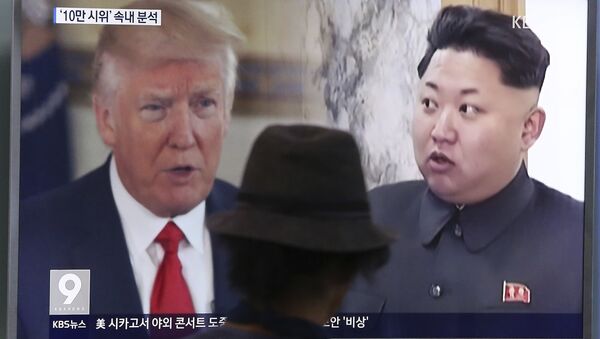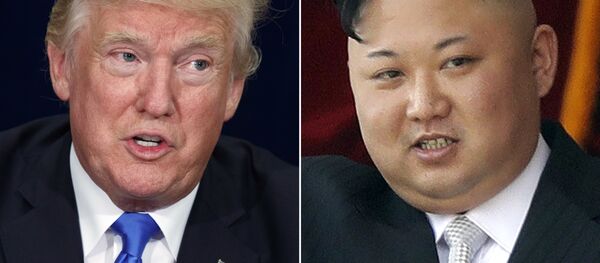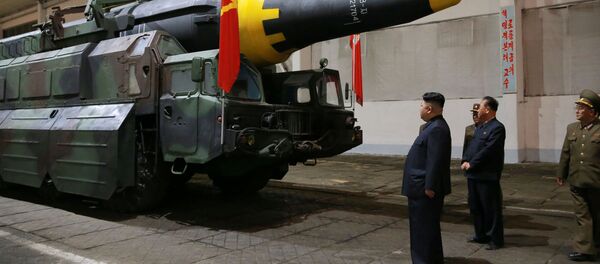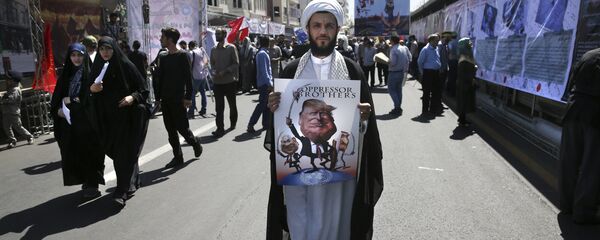Trouble is brewing for the much-anticipated June 12 summit in Singapore between US President Donald Trump and North Korean Supreme Leader Kim Jong-un following National Security Adviser John Bolton's "Libya model" remarks and Pyongyang's tough response on May 16.
According to Rakesh Krishnan Simha, a New Zealand-based journalist and foreign affairs analyst, Bolton is largely responsible for the ongoing controversy.
"John Bolton is way out of his depth when it comes to advising on matters of US national security," Simha told Sputnik. "He has committed nothing less than diplomatic harakiri by suggesting the Libya model of denuclearization for North Korea. Besides being offensive on so many levels, it carries the threat of regime change."
Alternatively, Bolton is nothing short of the Manchurian Candidate, Simha presumed, explaining, "Bolton may well be the man the military industrial complex and the neocons have chosen to torpedo the talks."
Why US Defense Contractors Interested in Trump-Kim Standoff
The US defense contractor's rationale is obvious: they are interested in a protracted confrontation in the region that brings them high revenues, the analyst explained.
"Earlier this month the US activated its Second Fleet which was deactivated in September 2011 after 65 years as one of the spinoffs from the end of the Cold War," Simha noted. "Now suddenly, citing tensions with Russia, the US is rebuilding it. You know how much a nuclear powered aircraft carrier costs? Approximately $12 billion. Plus you need at least 80 carrier-borne aircraft, a dozen warships and a couple of nuclear attack submarines, to defend that carrier. That's not counting oilers, supply ships and servicing vessels. So we are talking another $24 billion. So imagine the windfall awaiting the defense contractors in the US. The Korean confrontation is extremely good for them and peace is the kiss of death for them."
However, according to The New York Times, Trump "peppered aides with questions about the wisdom of proceeding" after the unpleasant episode with Kim.
Then, on May 19 the US president called South Korean President Moon Jae-in over Pyongyang's public statement.
On May 21, Vice President Mike Pence dropped the hint that "it would be a great mistake for Kim Jong-un to think he could play Donald Trump," which some media outlets interpreted as a sign that Washington still may abolish the summit.
Meanwhile, the South Korean president has found himself between a rock and a hard place as the Trump-Kim summit may collapse leaving no hope for a resolution of the Korean nuclear problem in the near future.
"From Seoul's standpoint, peace is good," Simha said. "Living next door to Kim can't be a pleasant feeling — especially at times when he lobs missiles right across Japan and South Korean waters. The South is a mighty industrial power and exports are its lifeblood. The last thing it wants is a shooting war."
However, while South Korea "would like things to cool down, it is a virtual American prisoner," the journalist highlighted, adding that the country's foreign policy "is tied to America's coattails."

Why Would Kim Denuclearize?
Simha reiterated his earlier assumption that the last thing Kim would do is denuclearize.
"The nuclear cover is the only protection Kim has. He's basically on his own. So why would Kim denuclearize?" the analyst asked rhetorically.
According to Simha, even if Trump and Kim sit at the negotiating table the talks "could go on for months because that's all the Americans can do and that's what Kim wants."
"The Asia Pacific region isn't America's bunny that the Middle East was," the journalist said. "The US cannot attack North Korea because he can lob a hydrogen bomb right back at Seattle or Salt Lake City. Plus, Russia and China have strong naval forces in the region so the US doesn't enjoy the air-sea-land dominance that it enjoyed in 1991 and 2003 in Iraq."
He opined that the North Korean leader apparently wants to trade the country's partial disarmament for some economic gains in return. In fact, Pyongyang has nothing to lose: North Koreans could actually "survive sanctions by tightening another notch in their belt," he stressed.
"No American president can outlast a North Korean leader. Whether Trump leaves offices in 2020 or 2024, Kim will still be around," Simha foresees.
The crux of the matter is that "there will be tensions with China, Russia or some other country that will wear down American resolve to press for denuclearization, which Kim isn't foolish to accept anyway," the foreign policy analyst concluded.
Earlier, John Bolton assumed while speaking to Fox News that the US was mulling over a Libyan denuclearization model for North Korea: "We have very much in mind the Libya model from 2003, 2004," he said. His remark prompted an outcry in North Korean state media on May 16. Pyongyang stated that it would be no longer interested in a dialogue with Washington and would "reconsider [its] proceeding to the DPRK-U.S. summit" in case the US pressures it into "unilateral nuclear abandonment."
The views and opinions expressed by Rakesh Krishnan and Ekaterina Blinova are those of the contributors and do not necessarily reflect those of Sputnik.





